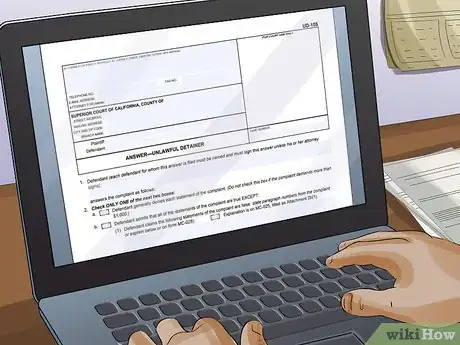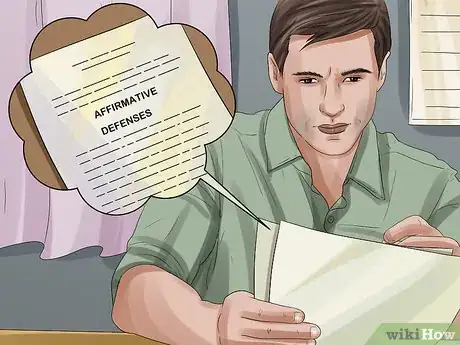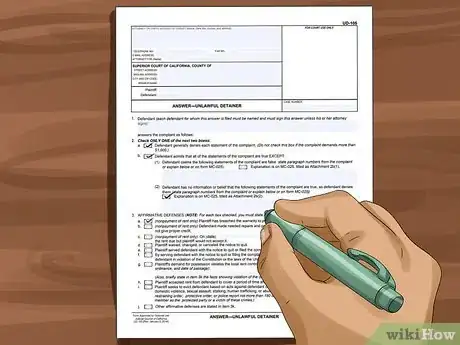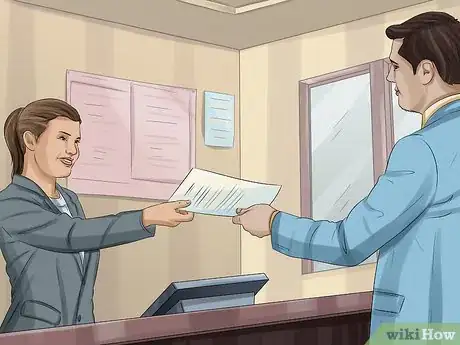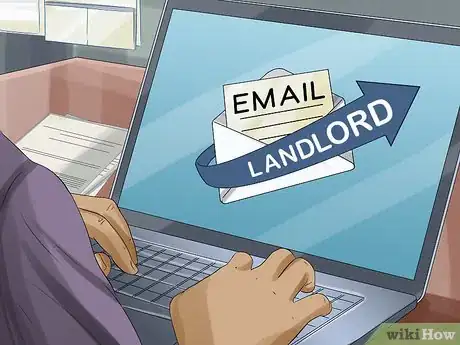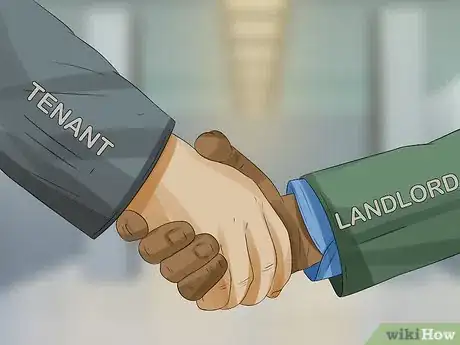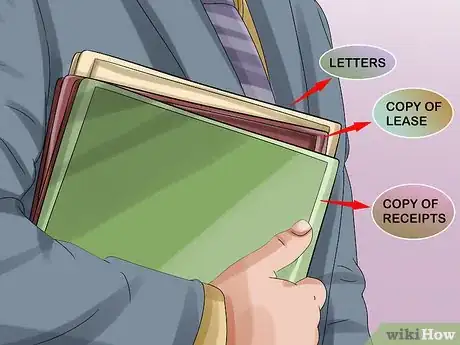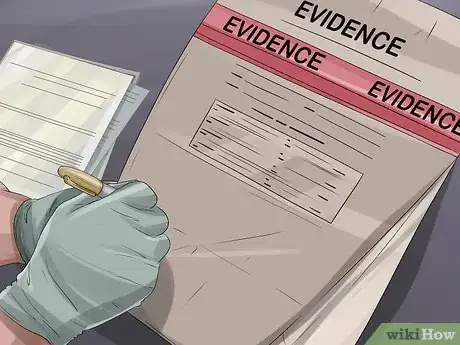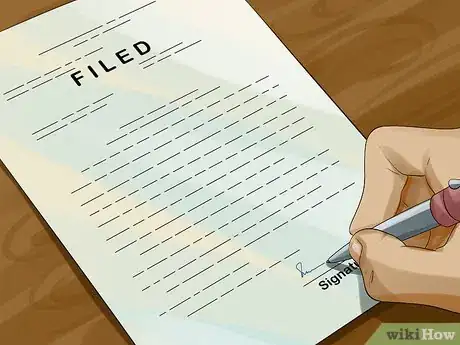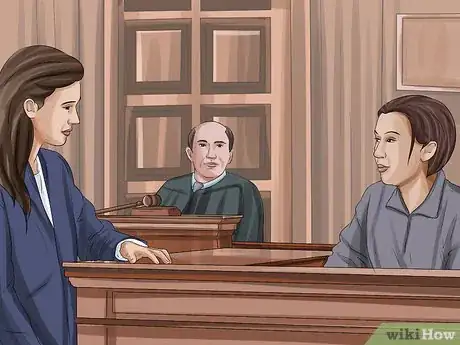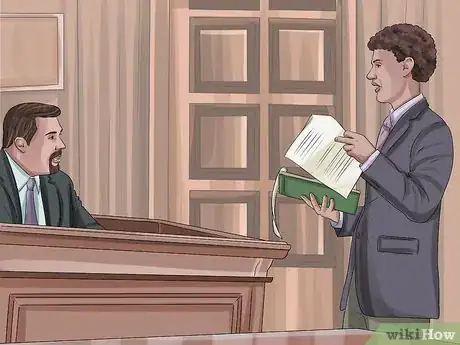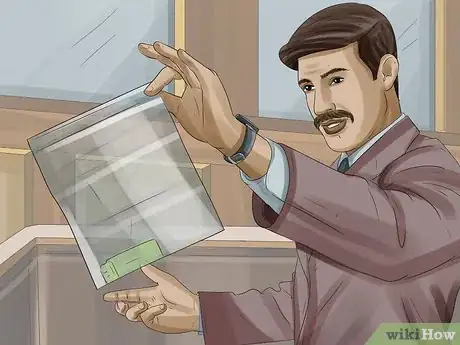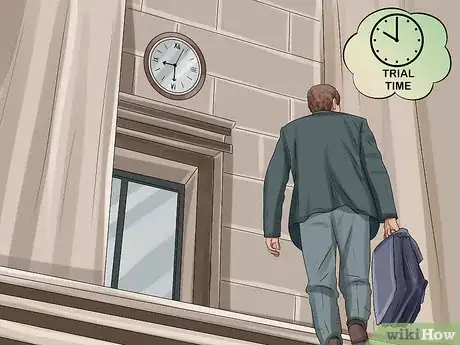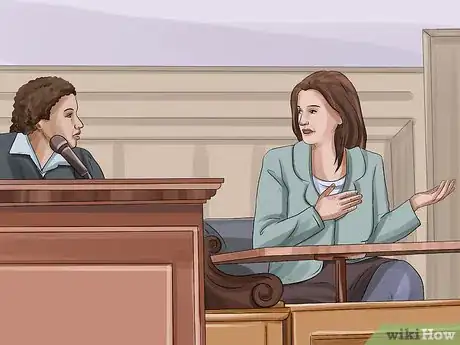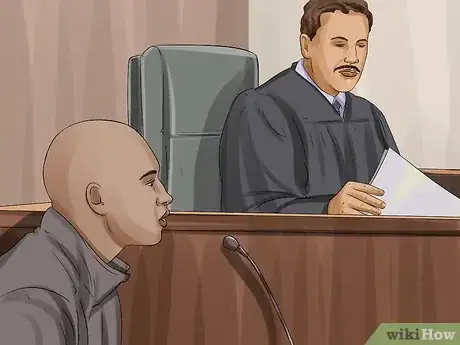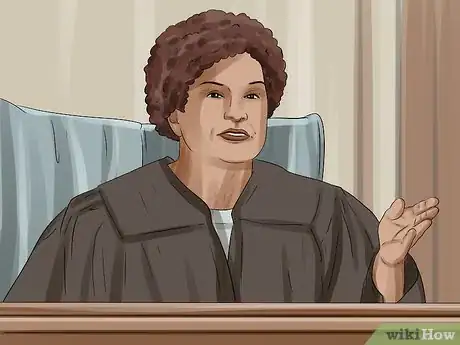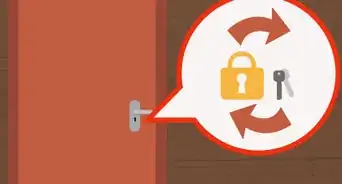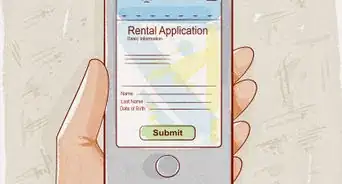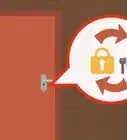This article was written by Jennifer Mueller, JD. Jennifer Mueller is an in-house legal expert at wikiHow. Jennifer reviews, fact-checks, and evaluates wikiHow's legal content to ensure thoroughness and accuracy. She received her JD from Indiana University Maurer School of Law in 2006.
There are 7 references cited in this article, which can be found at the bottom of the page.
This article has been viewed 27,548 times.
Getting served with an eviction complaint can be a frightening and traumatizing experience. Your first impulse may be to rip it up and throw it away, but getting rid of the document doesn't get rid of the problem. If you want to fight an eviction in California, you must file a written response to the complaint within 5 days. You do have rights as a tenant, and there may be defenses available to you. Build your case, maybe even with the help of an attorney, and have your day in court.
Steps
Filing Your Response
-
1Get a copy of the answer form. You must file a written response to your landlord's eviction complaint within 5 days. If the fifth day falls on a weekend or holiday, you can file your answer no later than the following Monday or non-holiday.
- You can get a copy of the answer at the clerk's office of the court where your landlord filed their complaint. The name and address of the court will be on the complaint. You can also download a copy at http://www.courts.ca.gov/documents/ud105.pdf.
- If you do not file this form within 5 days, you will lose your case and the court will enter a default judgment against you. However, keep in mind that this requirement may be different depending on how you were served.[1]
-
2Review your possible defenses. Read over your form carefully, particularly the "affirmative defenses" section. You may have to do some research to start building your case. The list of defenses on the answer form is a good place to start. A tenant’s organization or housing clinic in your area can help you analyze them.
- For example, your landlord may claim that you violated your lease in some way. Read through your lease carefully. If warnings are required before your landlord files for eviction, you may have a defense if your landlord failed to provide those warnings.
- Your rental unit, the building itself, and surrounding areas must be safe and in good condition. If your landlord failed to make repairs they knew needed to be made, or if there are hazards around your unit, this may also be a defense.
- If you recently complained to a building inspector or housing agency about the condition of your unit, you may be able to argue that your landlord is trying to evict you in retaliation for taking that action.
- Keep in mind that in some places, such as Los Angeles, the Rent Stabilization Ordinance (RSO) limits the reasons for eviction, which makes it harder for landlords to evict their tenants.
Advertisement -
3Fill out your “Answer” form. Copy the court information and your landlord's name and address exactly as it appears on the eviction complaint. Then check the box next to any defense that you believe applies to your situation. You may have to provide facts that support that defense.[2]
- The form you will need is called the “Answer” and it is available here: http://www.courts.ca.gov/documents/ud105.pdf
- Many of the defenses listed will be considered "waived" if you don't check the box and include them. This means you won't be able to raise that defense later, even if you find evidence that it applies to your case. Be judicious, but if you have a feeling something should be included you should err on the side of including it.
- You can get assistance filling out this form from a volunteer at a local housing clinic or tenant organization. Sometimes there are also clinics in court where you can get help filing out your form. If you find anything on the form confusing, get help before you file it.
-
4Take your form to the clerk's office. Make at least 2 copies of your forms and take your original and copies to the clerk of the court where your landlord filed their complaint. You will have to pay a fee to file your answer.[3]
- If you can't afford the fee, ask the clerk for a fee waiver form. The court may waive fees for you if they find you don't have enough resources to pay them.
- The clerk will file your original answer with the court and give the copies back to you. One copy is for your own records, while the other is for your landlord.
-
5Have your landlord served. You can serve your landlord either by certified mail or by paying a sheriff's deputy or private process server to hand-deliver the documents. If you use certified mail for service, you have to get an adult unrelated to you to do it for you.[4]
- If your landlord is represented by an attorney, you need to serve them instead of your landlord directly. The attorney's name and address will be listed on the eviction complaint.
-
6Consult an attorney. Especially if your landlord has an attorney, you will benefit from having your own attorney to help you fight the eviction. If you're worried about paying attorney's fees, pay a visit to your local legal aid clinic. There are also free and reduced-cost attorneys available through housing clinics and tenant organizations who specialize in fighting evictions.
- Most attorneys will at least provide a free initial consultation, so you can use that to get some advice on your case.
- If you ultimately decide not to hire an attorney, you can take advantage of assistance and resources at the public law library and self-help center in your local courthouse.
-
7Consider mediation or settlement. At any time during the eviction process, you and your landlord may be able to work something out on your own. The courts offer low-cost mediation services and encourage people to find mutually agreeable solutions to disputes.[5]
- If you can work out a deal with your landlord, even if you end up having to move out, you won't have an eviction on your record. If you're formally evicted, it will stay on your credit report for 7 years and can make it difficult for you to rent somewhere else.
Building Your Case
-
1Gather documents related to your tenancy. At a minimum, you'll need all the documents filed with the court, a copy of your lease, and copies of any receipts, letters, or other communication between you and your landlord.[6]
- If you're arguing that your unit was unsafe or unsanitary, you can also make photos that show the conditions of the unit or damage to the exterior of the building.
- You may also want to get copies of any inspections that were performed, either by government inspectors or by your landlord.
-
2Look for evidence to support your defenses. Go back and look at the defenses you checked off to include in your answer form. Brainstorm ways to prove that particular defense is true. You must have factual evidence to support any defense you talk about at trial.[7]
- For example, if you are arguing that your building or the surrounding grounds or common areas are unsafe, you could go out and take photos of the conditions.
- If your landlord gave you a 3-day notice and later accepted a rent payment from you, a canceled check or line on your bank account statement showing the rent was accepted would prove that defense.
-
3Request discovery. Your landlord may have documents or information related to your tenancy that could help your case, or even alert you to another defense. You have the right to request this information from your landlord.
- Keep in mind that it is difficult to get discovery for non-payment of rent. However, you might possibly be able to get a discovery motion granted if the issues are complex and the judge believes they merit discovery.
- To request discovery, you will have to file a motion for discovery along with your demands for documents and/or any deposition notices.
-
4Ask witnesses to testify. If you have any friends or neighbors who can provide personal testimony that supports any of your defenses, you can have them come to court and answer questions from you, your landlord, and the judge.
- For example, if one of your defenses is that your unit and building were unsafe, you may want neighbors to testify about the condition of the property.
- If a witness isn't willing to appear in court voluntarily, you can go to the clerk's office and ask them to issue a subpoena.
-
5Ask for an interpreter if necessary. You have the right to an interpreter if you or any of your witnesses don't speak English very well. If you need an interpreter, either for yourself or for a witness, let the clerk's office know as soon as possible.[8]
- You will not be charged a fee for the interpreter's services, so err on the side of caution.
-
6Organize your evidence and outline your case. If you're representing yourself, you'll make a good impression if your presentation is clear and coherent. Draft an outline of what you want to say and put your evidence in order as you plan to present it.[9]
- Make at least 3 copies of every original document, if possible. You'll need one for the judge, one for your landlord, and one for yourself.
- Use a binder or folders to keep your documents neatly organized. Include some blank paper and a pen or pencil so you can take notes during the trial.
-
7Read court rules if you don't have an attorney. If you've decided to represent yourself in court, you are still expected to know and follow the court rules of procedure and evidence. Your court's self-help center has resources to help you.[10]
- You may also want to go to court before the date of your trial and observe other eviction trials so you can become more familiar with the procedures. These trials are open to the public, and the clerk can tell you when they're scheduled.
Attending Your Trial
-
1Arrive at the courthouse at least 30 minutes early. Your trial notice will have a date and time. That time isn't necessarily the time of your hearing, but it's the time you're supposed to be in the courtroom. Go early so you have plenty of time to go through security and find the right courtroom.[11]
- Dress in clean, conservative clothing, as though you were going to a job interview or a religious service.
- Silence your cell phone and leave any other electronic devices at home.
-
2Take a seat in the gallery until your case is called. Typically the judge is hearing several eviction cases in one day. Eviction is a summary proceeding, so the trials typically don't take very long.[12]
- When the judge or court officer calls your case, you can move to the front of the courtroom and stand behind the front tables. Do not sit down until the judge tells you to do so.
-
3Listen to your landlord's side of the story. Since your landlord filed the complaint, the judge typically will call on them to speak first. They will present evidence and explain why they believe you should be evicted.[13]
- You may have the opportunity to ask your landlord questions. Otherwise, don't speak to them or interrupt them when they're speaking. If they say something you believe is factually inaccurate, make a note of it so you can mention it when it's your turn.
-
4Explain your side of the story to the judge. After your landlord has finished, you will have an opportunity to tell the judge why you shouldn't be evicted. You can call witnesses and introduce evidence that supports your argument.[14]
- Address your statements to the judge (or to your witness, if you're asking questions). Always refer to the judge as "your honor." Some judges are also okay with "sir" or "ma'am," but stick to "your honor" unless you know for sure.
- Speak loudly and clearly so you can be understood throughout the courtroom. If the judge stops or interrupts you, stop speaking and listen carefully to what the judge has to say. Answer any questions from the judge before you continue. It's also polite to ask the judge if you may continue before you do so.
-
5Listen to the judge's decision. After hearing from both sides, the judge will decide whether you have the legal right to stay in your rental unit. If they decide you do, they may order your landlord to pay your court costs and attorney's fees (if any).[15]
- If the judge decides in favor of your landlord, they will issue your landlord a "Judgment of Possession." Your landlord will get the clerk to issue a "Writ of Execution." When delivered to the sheriff's department, this allows the sheriff to lock you out of your unit. The sheriff will serve you with notice and you have 5 days to move out.
- If your landlord wins, they may be entitled to back rent, as well as damages, court costs, and attorney's fees paid by your landlord.
References
- ↑ http://www.courts.ca.gov/27757.htm
- ↑ http://www.courts.ca.gov/documents/ud105.pdf
- ↑ http://www.courts.ca.gov/28662.htm
- ↑ http://www.courts.ca.gov/28662.htm
- ↑ http://www.courts.ca.gov/27917.htm
- ↑ http://www.courts.ca.gov/27840.htm
- ↑ http://www.courts.ca.gov/partners/documents/AffirmativeDefenses.pdf
- ↑ http://www.courts.ca.gov/27840.htm
- ↑ http://www.courts.ca.gov/1094.htm
About This Article
If you want to fight an eviction complaint in California, start by filing a written response within 5 days using the "Answer" form on the California courts government website. To see if you have a case, list all of your possible defenses in the "affirmative defenses" section. For example, you may have a defense if your landlord didn't warn you before filing for eviction, despite the rules of your lease. Also, make sure to include information that strengthens your defense, like if your landlord has ever failed to follow through on repairs. Then, take at least 2 copies of the form to the clerk's office and have your landlord served. From here, you may want to consult an attorney or use the court's low-cost mediation services to reach a settlement with your landlord. For more advice from our Legal co-author, including how to prepare for your trial, read on.
